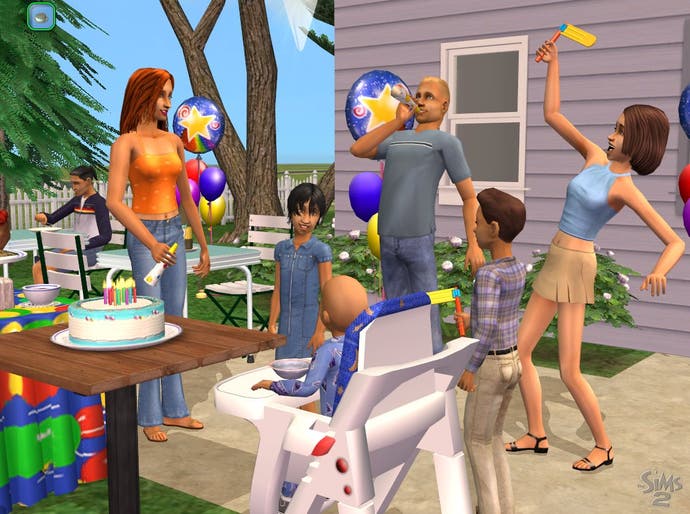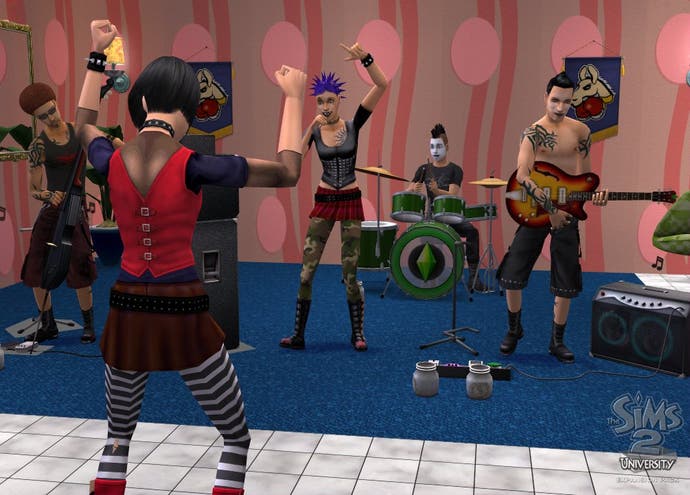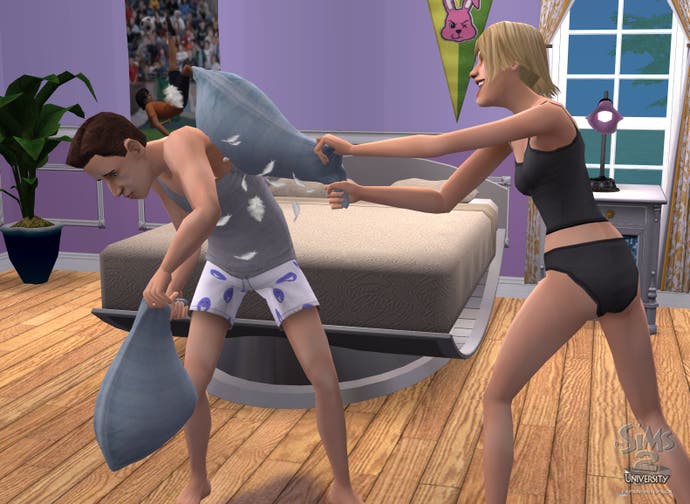The Sims 2 University Review
Off topic, but will someone please remake Skool Daze? Cheers.

While discussing Playboy: The Mansion last week, we lamented the state of the modern Sim Clones. Despite Hugh Hefner's digital love child being far from a brilliant game, it was still one of the finest things that have sprouted in Maxis' long shadow, because the rest of the lineage are incredibly rubbish rather than merely midly rubbish. The Sims has, perversely enough, proved to be the only huge-selling, genre-creating game in history which hasn't lead to an army of imitators. Doom begat endless Doom clones. Dune II/C&C begat a tank-rush of pretenders. Hostile Waters... well, we can't win them all.
Sims begat virtual nothing.
I've got about six theories on this, but I'll only torture you with one of them. Where with other games, the niche of interest in the experience was filled with other developers jumping on the boat, the Sims filled its own niche via its mission packs. Instead of a game leading to seven clones, it led to seven expansions, each differing enough from the main thrust of the Sims to act as one. And, most relevantly, the majority of the packs could have been expanded, with proper attention, into games of their own. The Sims claimed to be a life sim, but was only ever about suburban domesticity.
There's more to life than that, and in the mission packs is where we found it. So while in other genres we went to other games to have similar-but-different experiences, with The Sims we just went to another add-on pack. That's the reason why there's been so many and why they keep on selling. Sims isn't just part of a genre. It is the whole genre, including its competitors. They vary in quality, mainly because the further you go from the aforementioned suburban domesticity the less convincing the interaction mechanisms are and the more abstract the game has to be. Take, for example, the Superstar add-on pack for the original game, where becoming a star was as simple as hanging around a certain lot. It's a pretty cheap facsimile of the meet-and-greet your way to the top of real Hollywood but it's still facsimile enough to interest someone vaguely interested in the experience.

Or put into a simpler way, the reason The Sims sells so well is that it isn't just Doom. It's Doom plus Quake plus Half-Life plus Rise of the Triads plus Duke Nukem 3D plus Sin plus Hexen plus... well, you get the point.
So it's no surprise that Electronic Arts are going to try the same thing all over again with The Sims 2. And it's lucky that The Sims 2: University is probably the most coherent, singular statement of any of the Sims expansions and just shy of being a full game by itself.
And the word is game. For Sims haters, one of the main problems was the aimless progression based entirely on your own inclinations and desires. Any outside aims seem clearly artificial when applied to something as open as life. Even the desires your sims possess in Sims 2 may not be enough real motivation for you to progress. By placing the game on campus grounds, however, you have a situation which presents more classical game challenges to you without feeling arbitrary.
To boil University's insight down, while life doesn't have real failure or success states, exams do. This focus gives the pack a destination which traditional Sims normally lacks.
Playing across one of the three new campuses, you're able to either choose teenager Sims from your previous worlds or create whole new "Young Adult" sims for the experience. You then move them into an abode, and try to get them through the years of their degrees. While it's possible to have Sims move into their own flat, it's perhaps most interesting if you move into a dormitory. Here you get, for the first time, to actually live with Sims outside of your control. While everyone gets the privacy of their own room - and a lockable door proving useful at exam times - the communal areas are shared and bring you into context with a wide variety of Sims. While University doesn't nail the more decadent university experiences, keeping to the rather vanilla flavour of life of the series, it does nail the more mundane aspects. And that's "mundane" in the best possible way. Living with a group of people you haven't chosen and may not get on with in the slightest is both accurate to the real experience, and leads to some interesting interactions.

What makes it most feel like a game is that there's an active fail-state. Your Sims must maintain their grade average above a certain point (achieved by going to lectures, studying and writing their assignments or term papers) or be put on academic probation. Fail again next semester, and out of university you go. Career or intellectually minded sims have the easiest time of it, their happiness desires more related to actually doing the work. Romance or popularity Sims, trying to balance their desire for a decent social life with the need to turn up to at least a couple of lectures will find themselves skirting with disaster.
That said, for the really devoted there are ways around it. One of the new features is the influence meter, which adds to the direct game-feel too. By satisfying your Sims' desires, you gain influence. This can be spent on making computer-controlled Sims do something which they normally wouldn't. So, for popular Sims, you can make your way through college by getting your army of admirers to write your papers for you while you run around holding sports parties and similar. And - y'know - sleeping with your professor always helps.
It most fails in the areas where its mother game stumbled. The community lots outside your home, such as the library or the student bar, can find themselves rarely visited. At the least, the extra time it takes to load to just pop out for a quick pint dissuades you from ever leaving the abode. The Sims has traditionally done home life well, and the social world less so, and this continues here and hurts more because there's more of the University life based around sitting, swigging subsidised lager for fourteen hours a day. It's a shame, really. As successful as University is, it's in ignoring areas like this it shows how more rewarding a full game just centred around the 24-hour studying/parting people could be. Another minor quibble would be that the larger dormitories demand much from your system to lead to slow-down. The easiest solution is to move into a smaller place, but that's not quite acceptable.
While the new equipment and options integrates well with Sims 2 and one of four new specialist career paths can be opened up by graduating, Sims 2 University seems best thought of as a unique object. While Sims fans will have bought it already, this has a charm wider than those with Tattoos of Mortimer Goth on their chests. If dabbling in the Sims 2 appealed, but you desired something with a bit more structure, an application to the Sims 2 University is well worth filling in.

